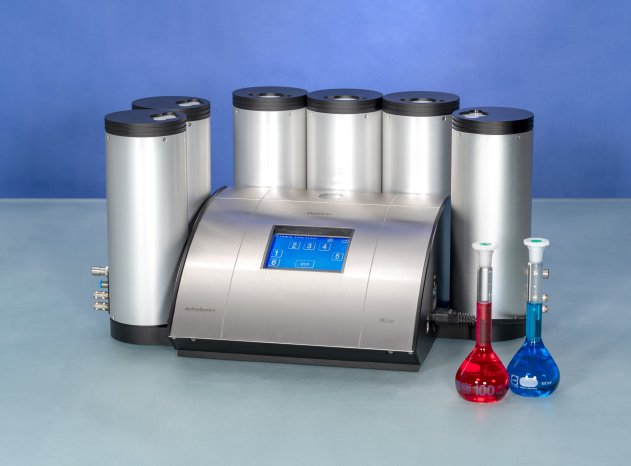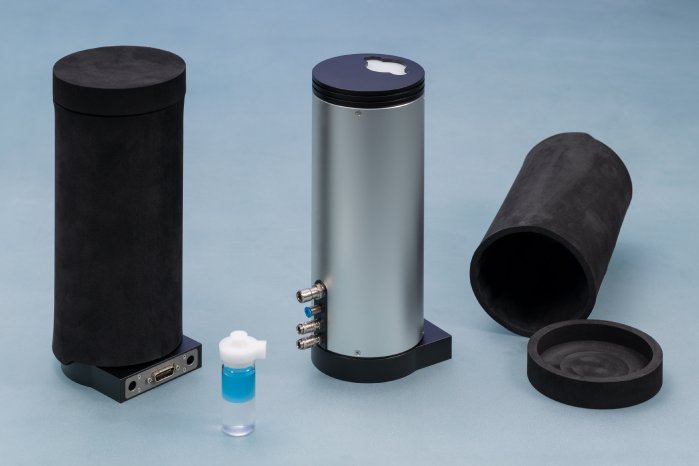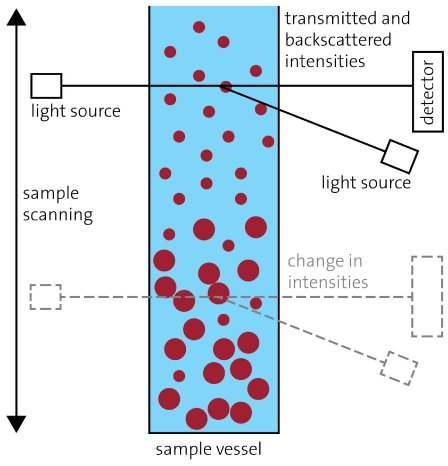Many products consist of complex multi-component mixtures. Often, long-term homogeneity and durability of such mixtures is of high priority in product development, as separation processes have a negative impact on product quality. Traditionally, separation processes are observed with the naked eye in a so-called “shelf-life test”. However, this procedure is subjective and often several weeks of testing are necessary for each optimisation round.
Measurements at Sub-Zero Temperatures Possible for the First Time
To solve this problem, the German laboratory instrument manufacturer DataPhysics Instruments offers the MultiScan MS 20 dispersion stability analysis system for an automatic stability and ageing analysis of liquid dispersions. The device was specially developed for the characterisation of suspensions and emulsions and enables a time- and position-resolved analysis of separation processes. With the MultiScan MS 20, such processes can be quantified more precisely and evaluated in more detail than with a conventional shelf-life test. The MultiScan MS 20 consists of a base unit, to which up to six sample chambers can be connected.
Up to now, measurements at constant temperatures and temperature profiles between 4 °C and 80 °C were possible with the MultiScan MS 20. Now, DataPhysics Instruments has succeeded in lowering the minimum temperature for measurements to -10 °C. To measure at sub-zero temperatures, the tower-shaped sample chambers of the MultiScan MS 20 are encased with an insulation sleeve. To prevent humidity from condensing on the samples, the sample chambers are flooded with dry inert gas during the measurement. The sleeves can be ordered in the desired quantity when purchasing a new device. Existing devices can be retrofitted for measurements at low temperatures.
Replicate Real Storage Conditions of Many Industries
Temperature is one of the factors that influence separation processes in dispersions. Therefore, when investigating new or improved mixtures, it is essential to examine them under real storage conditions. Dr Sebastian Schaubach, Chief Innovation Officer at DataPhysics Instruments, says: “We are particularly pleased to be the first manufacturer in this field to succeed in carrying out measurements at sub-zero temperatures.”
The enhancement of the MultiScan MS 20 makes it possible to examine dispersions under real storage conditions even for products that must be stored refrigerated. The European Medicines Agency, for example, requires in its 2007 guidelines on the "Declaration of Storage Conditions" that medicinal products are tested for stability and then labelled accordingly. Here, storage in the refrigerator is based on a temperature of approximately 5 °C, in the freezer below 0 °C. The extended temperature range is not only interesting for the pharmaceutical industry, but also in the food sector. Here, products are often stored refrigerated during production, transport, and in the home of the customer. The typical temperature of a refrigerator is often cited at 4 °C or lower. These conditions can now easily be replicated with the MultiScan MS 20.
Similarly, the MultiScan MS 20 can be used for outdoor products. This includes lubricants as well as paints and agricultural products. “The experts in our in-house laboratory combine an in-depth understanding of our measurement methods with a broad knowledge of specific applications in many industries,” explains Schaubach. And he continues: “We are also happy to accompany customers on new, exciting measurement tasks at sub-zero temperatures.”
Measuring Principle of the MultiScan MS 20 Briefly Explained
The MultiScan MS 20 analyses separation processes by measuring light intensities in a time- and position-resolved manner. The experimental setup is as follows: A sample is filled into a glass vial, which is then placed into a sample chamber. Two light sources and a light detector move up and down along the sample simultaneously. During the measurement, the entire height of the sample is scanned. The software analyses the light intensities that pass through or are backscattered by the sample. The intensities of transmission (i.e. the light that passes through the sample) and backscattering (i.e. the light that is reflected from the sample) depend directly on the number, size and type of dispersed droplets or particles.
Particles can settle on the bottom of the sample container, so more particles interact with the light in this layer. Particles can also cream and collect at the top of the liquid, so that more particles interact with the light in the upper layer. The sample then shows decreasing transmission intensities in the respective region of dispersion, while the backscattering intensities increase. In addition, particles can aggregate and droplets agglomerate, which can be observed as global changes in transmission and backscattering intensities.



